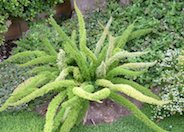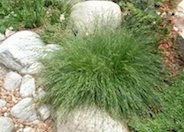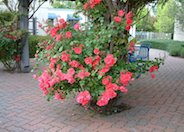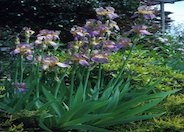
Common name:Myer's Asparagus, Foxtail Fern
Botanical name:Asparagus densiflorus 'Myers'
An evergreen groundcover, the 'Myers' also makes an excellent hanging basket plant when larger in size. Its formal looking fronds have an even, spiral arrangement of leaflets. It is damaged by severe frosts, and looks best with at least occasional watering. -Monterey Bay Nursery

Common name:Bear's Breech, Acanthus
Botanical name:Acanthus mollis
This perennial produces large clusters of glossy foliage that is deeply lobed. Its leaves may reach lengths of 2'. The tall, purplish-white flower spikes are usually seen in late spring to early summer. It can be used as an accent plant. Acanthus is an effective, shade loving, herbaceous shrub.

Common name:California Field Sedge
Botanical name:Carex praegracilis
This native Carex can be successfully used as a lawn substitute but requires significant water to obtain good coverage. Once coverage is reached, water can be reduced and maintenance is close to zero. Unmowed, the plant can be used effectively in a variety of conditions and will reach a height of 6" or under and spreads up to 2' by rhizomes.

Common name:Climbing Rose
Botanical name:Rosa Climbing varieties
With its dark green foliage and fragrant flowers with full and double blooms, this upright shrub is generally grown as a vine or pillar rose. Climbing varieties come in many colors.

Common name:Bearded Iris
Botanical name:Iris Bearded Hybrids
This perennial will grow 1'-3' tall and has medium sized, blue green leaves with flowers of different colors that bloom in spring. It needs well draining soil and full sun. Many are fragrant and rebloom several times a year. Plant rhizomes in Sept or Oct. They need water once a week during the hot spells. Top dress with compost and gypsum in January and August.
| Designer: Wynne Wilson | Shaded Sitting Area |
Photographer: GardenSoft |
Soils and Compost:
Incorporate compost 6" into your soil to retain water, reduce compaction, feed earthworms, and provide valuable nutrients to your plants.
Water Saving Tip:
Be sure to fix all leaks promptly no matter how small they may seem.
Integrated Pest Management:
Develop healthy soil for plants that are vigorous and naturally pest-resistant.

